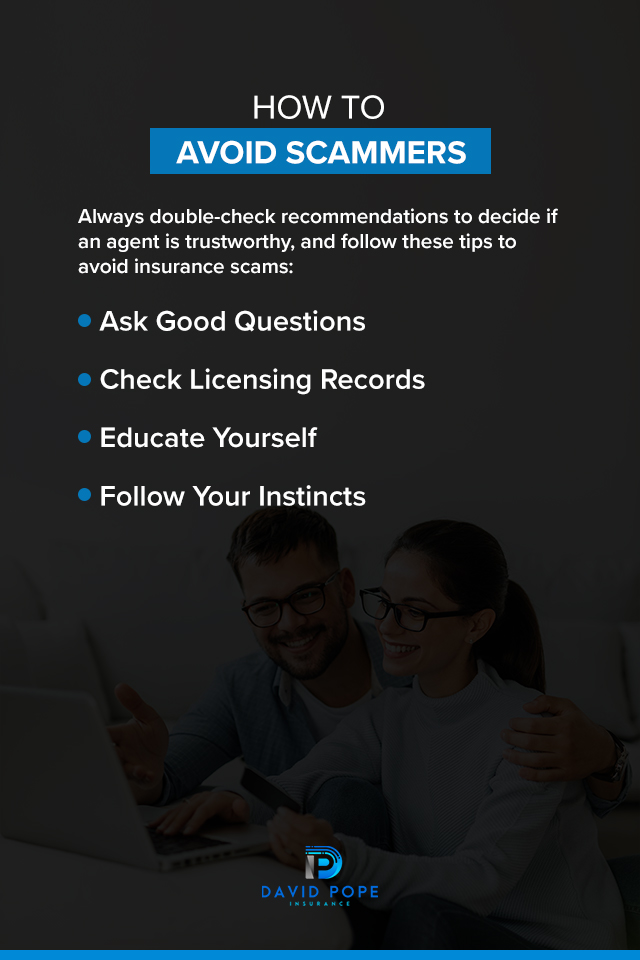Whether you are looking to buy insurance for the first time or are switching agents, remember that a good insurance agent will do more than sell you an affordable policy. The best insurance agents are informed about the products they sell, experienced in the industry and concerned with your personal needs. An exceptional agent can help you save money and make the entire insurance process more straightforward.
The U.S. Bureau of Labor Statistics reported that as of 2020, there were 507,200 insurance sales agents in the country. With so many insurance agents in your area and nationwide, narrowing down your options can be a challenge. If you are unsure what to look for in an insurance agent, here are a few steps to take you through the process.
More Insurance Agent Resources:
Word of mouth is a great way to find a good insurance agent and verify if they are trustworthy and knowledgeable. Friends, family and coworkers can provide excellent recommendations and even help you stay away from unhelpful agents.
The people you know will likely have constructive feedback about their agent for you to consider. Start the conversation with family and friends in person, or gather information from several people at once on social media. Be sure to ask probing and objective questions about your friends’ interactions with their agents to help you determine if the agent is a good fit for you. Ask questions like:
If the people you know have already screened several agents you are interested in, that could significantly shorten the vetting process. However, the positive experiences of your friends and family aren’t guaranteed to be your experience. There may be external factors influencing your friend’s perception of their agent. It is still essential to determine the agent’s credentials for yourself before committing to one.

If your friends or family have complaints about the agent you’re considering, take them seriously. A friend’s negative experience might be unique to their situation, but it could also be an issue with the attitude or professionalism of the agent. If it’s the latter, you could meet with the same difficulties.
In addition to people you know, other consumers may have also had a negative experience with that particular agent. Look for online testimonials from other people you haven’t met, and you could find that most people who work with that agent have complaints afterward. If someone takes the time to write an online review, they generally feel strongly enough about their experience to warn other people about it. Facebook, Yelp, Linkedin and other business review sites can give you a trove of helpful information.
As with personal recommendations, you should screen online testimonials carefully. Some customers complain about legitimate issues with the agent, while others might be motivated by another problem or frustration outside of the agent’s control.
If you can avoid an insurance agent who takes too long to handle paperwork, hardly answers questions or negotiates people into policies they don’t need, you can save considerable time and money. An agent who usually produces glowing reviews will likely show the same consideration and attention to detail to you as they did to others.
Reviews from other customers are only one source of information about insurance agents. Other professionals who deal with the same kind of insurance you are looking for could provide a list of agents with whom they often do business. The benefit of asking related professionals for their suggestions is that they might be able to offer you a broader range of options than your friends and family can.
For example, if you need home insurance, a title company might be glad to offer you their list of trusted agents. For health insurance, your healthcare provider could recommend the agents who offer policies that cover your health needs. If related professionals know your individual needs, they could direct you to an insurance agent who can handle them and has a good reputation among other customers.
When asking other professionals about insurance agents they might know, keep in mind that they could earn a commission for advertising a specific agent. After you receive a suggestion, always check that agent’s credentials and online reviews to see if other people agree that working with that agent is worth your time. The agents they recommend might also require higher premiums. Always get multiple quotes to determine if the agent is right for you.

Your state’s insurance regulatory agency is another good place to research agents and their credentials. A state’s insurance department keeps track of all the licensed insurance agents in your area. State insurance regulatory agencies are an unbiased source of helpful information that could influence your decision.
The National Association of Insurance Commissioners has an online tool to help you search for your state insurance department and quickly locate its contact information. You can find a good insurance agent within your jurisdiction, file a complaint and access state department contacts from their website.
Once you navigate to your state’s insurance department, you can use their site to search for agents and check their license status. In many states, you can also request that the government provide you with information about any complaints or disciplinary actions against a particular agent. You can access the agent’s history in the insurance business and check other data on insurance companies, like statistics and mergers.
Researching data and hearing about other peoples’ experiences can only get you so far. Ultimately, the best way to judge how well you would fit with an insurance agent is to meet with them face-to-face. A conversation in person is an excellent way to determine an agent’s knowledge and demeanor and can help you gauge the agent’s level of customer service.
When you’ve narrowed down your list of potential agents to a handful, schedule interviews with each of them. During your conversation, you should be able to make decisions about the following:
It is essential to ask good questions during your interview to know the agent and their ability to provide a positive experience. The following topics are some of the most essential to ask a potential agent about:
If the agent asks you questions in return, engages your needs and answers your questions knowledgeably, the chances are that they can look out for your best interests if you become their client.
An agent’s professional background is a crucial component of their qualifications. Ensure a potential agent’s license is up to date and meets state requirements. Insurance agent licensure is generally easy to look up through a state’s insurance department website. If an agent is uncomfortable providing you with a copy of their license, you should be apprehensive about working with them.
Negative reviews online are one thing, and official complaints are another. Customers may file an official complaint if they feel their case has been mishandled. These complaints require more involvement than writing a review online, so if a potential agent has several complaints in their records, you may want to beware.
You can verify official complaints against an agent through your state’s insurance regulator’s website. An agent with a good record demonstrates that they put their clients’ needs first and communicate transparently, helping their clients avoid inadequate coverage.
An experienced agent will maximize your protection while minimizing your costs. Someone who has handled cases like yours multiple times can help ensure you are adequately covered. When you have an expert protecting your assets, you gain peace of mind and can end up saving a lot of money when you need to file a claim.
A potential agent will generally indicate whether they are knowledgeable about your particular situation. Their level of expertise will likely be evident in the way they speak with you and about your concerns. An experienced insurance agent should explain your options without using technical terms or in a way that makes those terms easy to understand.
An agent with a great deal of experience handling your type of insurance will likely make the process easier and simpler. Your agent should be confident in expressing your options and endorsing a specific policy. However, beware of overly aggressive agents, as they may be more interested in gaining a commission from adding new clients than they are in providing customer service.
To provide you with the most coverage at the best price, an agent must know the insurance products available and how you can qualify for them. An agent should provide a comprehensive overview of all your options and how each one will affect your coverage, ultimately providing personalized suggestions to match your needs.
If you have a high-risk situation or other unique concerns, you can gather from an interview how the potential agent would handle your insurance needs. Get specific with your questions and see which agent gives you the best advice. Although you aren’t their client yet, an interview should reveal their attitude about providing service.
A successful insurance agent will also stay informed about changing insurance requirements and may continue their professional development through advanced certifications or other kinds of industry experience. Someone who pursues knowledge beyond what is required is more likely to provide you with personalized, expert attention.

According to the Federal Bureau of Investigation, insurance fraud costs over $40 billion yearly. That means that the average American family will pay an additional $400 to $700 per year in increased premiums to cover the damage.
Premium diversion is when an insurance agent doesn’t send premiums to the underwriters and keeps them for personal use. Another common scam is when unlicensed people pose as insurance agents and collect on your premium without providing a valid policy or actual credentials.
You want to avoid filing an insurance claim after an accident or emergency, only to discover that you have no coverage. Always double-check recommendations to decide if an agent is trustworthy, and follow these tips to avoid insurance scams:
An agent should be an insurance expert. If a potential agent cannot answer your questions or seems to ramble without making sense, they could be scamming you. In an interview, ask about their credentials and where they earned them. In addition, ask about how they will help you if you need to file a claim. These questions can reveal how familiar a person is with the insurance industry.
However, you can’t necessarily trust a person’s experience in the interview alone. Be sure to go back and research to see if state records align with the agent’s claims. If the agent you are interested in has no credentials on your state’s insurance regulator website, the agent likely isn’t legitimate. A lack of licensing records indicated that they might not be legally permitted to sell you insurance.
You don’t have to be an insurance expert, but having more than basic knowledge about how insurance works can protect you from scammers. Educate yourself to determine if someone is providing you with false information. Be aware of essential aspects of insurance, like the fact that higher risk generally entails a higher premium. Having a claims history also impacts premiums. If the policy you are offered doesn’t align with common insurance practice, something may be off.
If you are educated about insurance practices and have done plenty of research, you can also follow your instincts to determine an agent’s legitimacy. If something seems off, it very well could be. Resist pressure from any insurance agent, licensed or not. The best agents will allow you to make your own decisions based on what you believe works in your best interest.
When giving out personal or banking information, always use caution — research thoroughly before paying for costly services. You should also receive a copy of your policy shortly after your purchase. If you do not receive this copy, you should question your insurance agent or broker.

Purchasing insurance is a momentous decision. When you need to file a claim, having adequate coverage and a helpful agent on your side makes a huge difference.
At David Pope Insurance Services, LLC, we understand that your insurance needs are unique. That’s why we strive to provide flexible policies at the best possible rates, ensuring that we can offer individuals and families the coverage they need to stay protected. We provide home, life, auto and commercial policies that can fit every budget. We are family-owned and employ local agents, so your insurance policy gets a personal touch from professionals who truly care.
We are committed to providing our customers with excellent service by smoothing out the insurance process. To learn about what David Pope Insurance can do for you, contact us today and request a free quote.